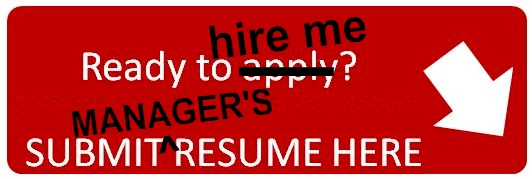Question
This is not a news flash to anyone that reads your website: The flood of resumes and job postings makes job seekers feel like cattle while they’re applying for jobs. We know the hiring process is even more impersonal and bureaucratic the farther we get into it. We can’t control this out-of-control cattle drive, but once we’re actually in a job interview (ring the bell!) how can we exert some control so we can stand out among even more competition? It’s clear the rules of interviewing don’t work! Companies have so many applicants to choose from that they hesitate to hire anyone at all!
Nick’s Reply
 When the rules of interviewing don’t work, agile job applicants change the rules. I’ll tell you the story of a job seeker I met during an intense 1-hour Talk To Nick consultation I did recently to help her break through an employer’s hesitation.
When the rules of interviewing don’t work, agile job applicants change the rules. I’ll tell you the story of a job seeker I met during an intense 1-hour Talk To Nick consultation I did recently to help her break through an employer’s hesitation.
When the rules of interviewing don’t work
Jing came to the U.S. from China on a work visa only to lose her job during the recent downsizings. She has rare technical skills but suddenly found herself adrift in a very weird job market. (“We can’t find the specialized candidates we need! But we’re flooded with job applications!”)
For several months she applied the rules of interviewing she’d learned from her American friends. It was the same-old advice we all know — put the right keywords in your resume, recite your strengths and weaknesses, study up on the common behavioral interview questions, tell them you’re flexible on salary, let the interviewer lead, try not to be nervous, and so on.
Because of her job skills, Jing had plenty of interviews. But, she told me, it always ended after one or two rounds. She really felt she was following all the rules. She always got compliments after her interviews. So why was she getting no offers?
Control the interview: Make it a conversation
Jing is smart, insightful and grasps things quickly. But she couldn’t get past the barrage of rote interview questions — her language barrier put her at a disadvantage. So I showed her how to turn away from the rote Q&A script managers usually follow, and to have a slower, more casual conversation with the hiring manager instead.
Later, she told me that was the secret sauce for her. She felt she was coming off as very stiff and overly formal because she was doing her best to follow the prescribed script.
“In all my interviews I could not make myself relax and do my best because I was trying to follow all the rules my friends taught me about interviews. By changing my tone to conversational, the manager relaxed, it was friendly and we were able to really talk! That made me able to show my best!”
Two days after our session, Jing went on her next interview. At first the manager was uncomfortable with Jing’s accent, but Jing compensated by speaking more slowly. Then she then expressed her interest by asking the manager about his team. While he talked, she relaxed.
She asked the manager what he needed a new hire to accomplish. He told her that in spite of her weak English language skills, he was impressed with her communication skills and by her focus on the job tasks. The rest of the interview was about the work, and she had a good offer in just hours.
“I didn’t know I could control a job interview like that just by asking the manager to talk about himself!” Jing said to me later
There are many ways to control a job interview by breaking the script that makes interviews so awkward. Two of the most important are (a) change the subject, and (b) focus on deliverables.
Change the subject
Job candidates are naturally self-conscious in interviews because they’re on stage. They are the focus. They must perform by answering questions. This interview script, which the manager and candidate buy into, can create immense stress and actually weaken the candidate’s presentation.
A candidate can take control of the initial part of the interview and break the script by encouraging the manager to talk about themselves. In fact, research reveals that “letting someone share a story or two about their life instead of blabbing about yours could give them more positive memories of your interaction.”
(There’s science behind this tactic! Studies in social psychology suggest that when we express interest in another person they are more apt to like us. That may seem obvious, but few people know how to apply this fun fact of psychology to a job interview.)
With a big, friendly, curious grin, ask the manager, “So, what brought you to this company?” Or, “Have you found the challenges of your job have changed since you started working here?”
Be polite, be gentle and friendly, be curious, and — like Jing — be conversational!
By changing the subject temporarily, you can nudge a stress-inducing interview toward an engaging conversation that reveals to the manager how different you are from other applicants. That is, it makes you stand out positively. As long as you’re also ready to talk about how you’ll do the job, this brief respite can change your meeting dramatically for the better.
Deliver deliverables
A job candidate can also break the interview script — and control the meeting — by helping the manager think in terms of deliverables. (We discussed this at length in Stupid Interview Questions: #11.) Ask the manager, “What do you expect your new hire to deliver in the first month, 3 months, 6, 12 and then at 18 and 24 months?”
This is another way to make the manager talk and to put the focus on the job rather than on you.
Managers are hampered by the standard, rote questions they’ve been taught to ask. Helping them see that your focus is on deliverables changes the way they view you. You suddenly stand out because you’re showing you’re all about the work.
Change the rules of interviewing
The rules of interviewing don’t work because they rely on a artificial script. Like Jing, you can take control of your interviews by having a real conversation with a hiring manager. Just change the rules!
What are the rules of interviewing? Which ones work, and which don’t? Do you control your interviews so that you’ll stand out from your competition? What’s the best way to do that?
: :




 It just happened again. An interviewer asked me one of those trick questions. “What is your biggest weakness?” I actually researched this one. There are all kinds of
It just happened again. An interviewer asked me one of those trick questions. “What is your biggest weakness?” I actually researched this one. There are all kinds of  When a company wants to interview me, I apply your advice and try to exert some control by asking that the hiring manager be present at my first interview. I think it’s inappropriate for an employer to ask me to invest hours of my time without that manager present. It worked recently with a small advertising company, and it actually helped the two-way respect, and I felt more confident talking about the role and compensation.
When a company wants to interview me, I apply your advice and try to exert some control by asking that the hiring manager be present at my first interview. I think it’s inappropriate for an employer to ask me to invest hours of my time without that manager present. It worked recently with a small advertising company, and it actually helped the two-way respect, and I felt more confident talking about the role and compensation. Like my old mentor used to say, Use your judgment every step of the way, and do the best you can. And in the end, make choices — don’t let the other guy make them for you.
Like my old mentor used to say, Use your judgment every step of the way, and do the best you can. And in the end, make choices — don’t let the other guy make them for you.